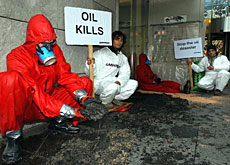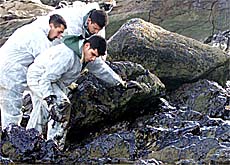Oil spill puts Swiss traders in spotlight

The sinking of the oil tanker "Prestige" off the Spanish coast has focused attention on Switzerland's role as a commodities trading centre.
A large share of the world’s oil, gas and agricultural products is traded through Swiss-based firms, most of which have an aversion to publicity of any kind.
The oil currently seeping from the hull of the tanker, Prestige, is owned by Crown Resources in Zug, a subsidiary of a Russian firm.
The company has refused to make any comment about the sinking – indeed, even the presence last week of Greenpeace activists smearing oil mud from the Prestige across Crown’s front steps elicited no response.
Crown is one of hundreds of trading firms centred around Zug in central Switzerland and the Geneva/Lausanne area. The exact number is not clear – not even the Swiss government has a complete list – but it is known that these firms handle a substantial share of world trade in several key commodities.
Zug, with a population of 100,000, has some 18,000 firms, many of which are attracted by the canton’s low tax rates, and the privacy afforded by a location with many like-minded people.
Oil and raw materials
“One company attracts other companies dealing in the same line of business,” said Zug Green Party parliamentarian, Josef Lang. “In Zug, people are used to working in the oil and raw materials businesses.”
According to Lang, there are between ten and 20 of these companies working there, including British Petroleum and Glencore (which last year was Switzerland’s second largest company by turnover, after Nestlé).
For Zug the benefits of playing home to such firms are clear, even though the tax take is small (Crown is said to have paid somewhere between SFr100,000 and SFr200,000 in tax over the past three years).
Supporting these trading firms is a small army of lawyers, bankers and accountants, making Zug a premier business location.
“The clergy used to be all-powerful in Zug, but nowadays it’s the lobby of business lawyers who are calling the shots,” Lang told swissinfo.
He added that these lawyers are politically active and have influence over the canton’s tax policies.
Second only to London
On the other side of the country, between Geneva and Lausanne, at least 350 trading firms buy and sell products in such volume that canton Geneva touts itself as the world’s second-biggest trading centre, after London.
There firms specialise mainly in agricultural goods: 30 per cent of the world’s grain is bought and sold around Geneva, along with one fifth of the sugar and one tenth of its cotton.
Some oil is also traded in Geneva ($15 billion worth), including much of Russia’s production, but gas is the fuel of choice, with ten per cent of the world’s output bought and sold there.
As in Zug, insurance companies, law firms and fiduciaries support these vast trading operations. The area also has its fair share of shipping companies and brokers even though the nearest port specialises in passenger ferries on Lake Geneva.
Banks, too, make sure they get their share of the action, offering warranties, loans, financing and other services. Even the state-backed Vaud cantonal bank makes a tidy sum out of the traders’ activities – it has 85 specialists dealing exclusively with shipping and trading.
The downside, for Zug especially, is that the presence of these firms, however lucrative, does cost the canton something in reputation.
The Prestige oil disaster is likely to reinforce its image as a home for secretive firms bent on limiting their tax bill.
There is one consolation, though: the mud from the Crown affair will be long gone by the time Crown’s oil disappears from Spain’s beaches.
swissinfo, Scott Capper
Zug with a population of 100,000 is home to some 18,000 firms.
The area between Geneva and Lausanne has at least 350 trading firms.
They buy and sell 30% of the world’s grain, 20% of its sugar, and 10% of its cotton.
Ten per cent of the world’s gas is also traded in canton Geneva.
The oil seeping from the hull of the tanker, Prestige, is owned by Crown Resources in Zug.
Crown is one of hundreds of trading firms in Switzerland which handle a large share of world trade in oil, gas and agricultural products.
Canton Geneva is said to be the world’s second-biggest trading centre, after London.

In compliance with the JTI standards
More: SWI swissinfo.ch certified by the Journalism Trust Initiative

You can find an overview of ongoing debates with our journalists here. Please join us!
If you want to start a conversation about a topic raised in this article or want to report factual errors, email us at english@swissinfo.ch.